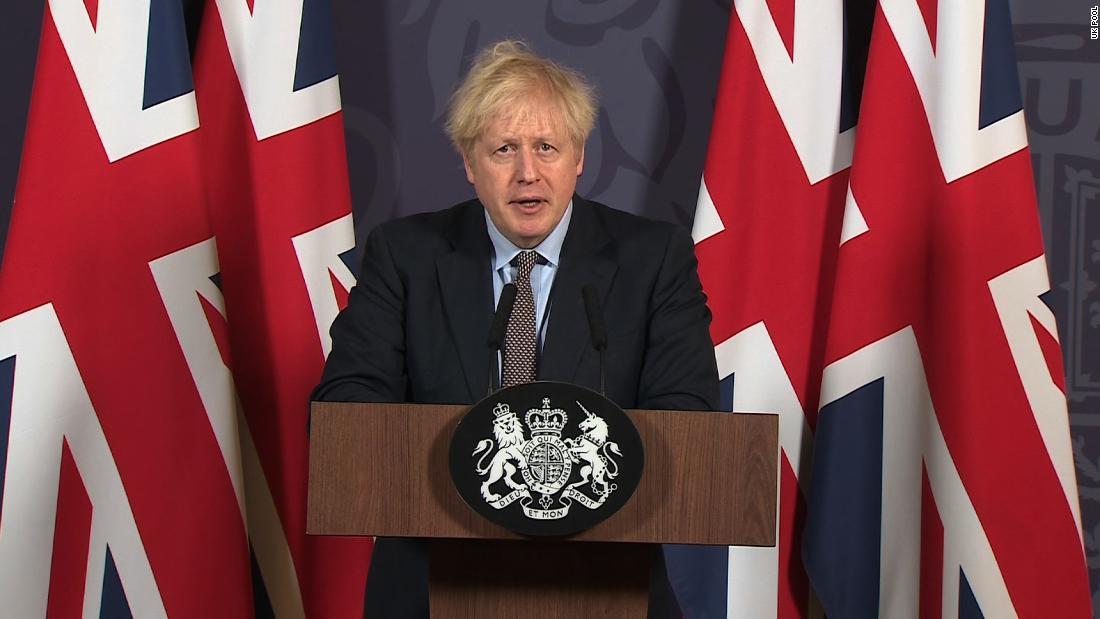
The end of the transition period, four and a half years after the majority of the UK voted to leave the European Union, is a significant moment in the country’s history. After nearly five decades as part of the bloc, the UK will now forge a different path.
The Prime Minister of the United Kingdom, Boris Johnson, said on Thursday that Britain will be a country “open, generous, with a foreign, internationalist and free trade vision” that is “free to do things differently and, if necessary, better ”than the EU.
“We have our freedom in our hands and it’s up to us to make the most of it,” Johnson said during the New Year’s speech, just hours before the end of the transition period.
On Wednesday, opening the debate on the bill, Johnson told members of Parliament that the deal “would open a new chapter” and allow the UK to take “control of our laws and our national destiny”.
But critics warn that the UK economy will suffer as a result of Brexit, as many companies are unprepared for future changes, especially when the nation will falter under the impact of the coronavirus pandemic.
Now that the UK has abandoned the single market and the customs union, goods crossing the border will be subject to customs and other controls. Delays and interruptions can occur as carriers discover that they do not have the correct documentation or that new software systems collapse under pressure.
Keir Starmer, leader of the main opposition Labor party, warned last week that “there are serious questions about the government’s readiness for new arrangements” after negotiations stalled.
He told Labor lawmakers to support the bill instead of risking the “devastating” consequences of the UK’s fall outside the EU without any trade deal. But Starmer said the “thin deal” reached by the Johnson administration “does not provide adequate protection for British manufacturing, our financial services, the creative industries or workplace rights.”
The EU-UK trade agreement did not cover Gibraltar, the British overseas territory at the southern tip of the Iberian Peninsula.
Just hours before the transition deadline expired on Thursday, Spain and the United Kingdom announced that a draft agreement had been reached on their post-Brexit status.
“It’s time to leave Brexit behind”
The European Parliament is expected to examine the agreement later before it can be formally ratified by the European Union.
The agreement with Brussels establishes a new trade and security relationship with the UK’s largest trading partner. It was finally nailed down after months of blockades in areas such as fishing quotas, as the UK would use state aid to support British companies after Brexit and legal oversight of any deal.
The deal, which preserves Britain’s free access to tariffs and quotas to block consumers, saves the UK from some of the most dire potential consequences of Brexit in fighting a crippling pandemic.
The agreement also appears to cover most of the trade in goods, where the UK has a deficit with its EU neighbors, but excludes major service industries such as finance, where it currently enjoys a surplus.
Silenced celebrations
Some British newspaper covers sounded a triumphant note on Thursday despite the potentially rocky road ahead.
“Britain is finally free of the EU,” the Daily Express said, while the Times of London declared “It is a farewell to all this when the Brexit trade agreement was signed.”
But rising rates of coronavirus infections may give hope to any Brexit supporter to celebrate the end of the transition period on British streets.
More than three-quarters of England’s population are now under the country’s toughest restrictions, with the aim of limiting the spread of a new, more contagious coronavirus variant.
News of this variant caused France, along with other European nations elsewhere, to have trips from the United Kingdom. When thousands of trucks were stranded in the British port of Dover in the run-up to Christmas, some observers feared it also foreshadowed the potential chaos of a Brexit without an agreement.
Meanwhile, it remains to be seen the full impact of Brexit on British residents in the EU, as well as on EU citizens living in Britain. The 3 Million, a grassroots organization of EU citizens in the UK, has raised concerns about those not realizing they should apply to the EU agreement plan by the end of June to protect their rights in the UK.
Gibraltar Agreement
The agreement reached in principle between London and Madrid will avoid a hard border between Gibraltar and Spain, Spanish Foreign Minister Arancha González Laya said on Thursday.
It was something many local residents, on both sides of the border, had feared when the transition period ended, he said.
González Laya said a provisional period of six months was expected until a new treaty was finalized. Unlike the rest of the UK, Gibraltar will continue to be part of EU agreements, such as the Schengen area, which will allow a free flow of people and goods across members ’borders.
“Spain will be ultimately responsible for the implementation of Schengen in Gibraltar,” González Laya said.
UK Secretary of State Dominic Raab said the UK had a “warm and strong relationship with Spain”.
“Today, working side by side with the Prime Minister of Gibraltar, and after intense discussions with the Spanish government, we have reached an agreement on a political framework to form the basis of a separate treaty between the United Kingdom and the “We will now send it to the European Commission to start negotiations on the formal treaty,” he said.
“In the meantime, all parties are committed to mitigating the effects of the end of the transition period on Gibraltar and, in particular, ensuring border fluidity, which is clearly in the best interests of people living on both sides.”
CNN’s Vasco Cotovio, Ivana Kottasová and Niamh Kennedy contributed to this report.